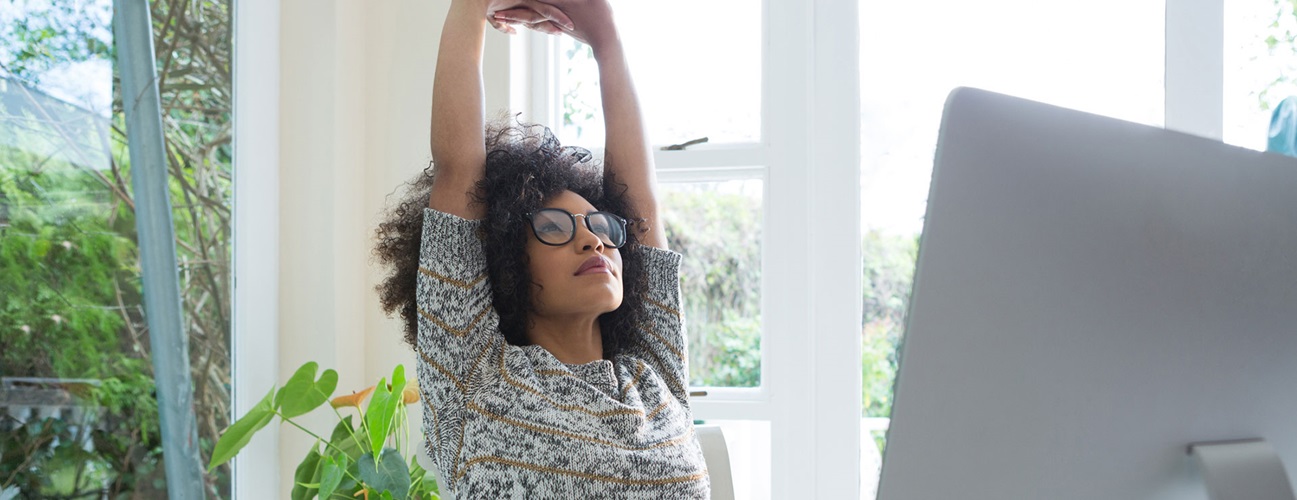Coronavirus: Practicing Wellness While You Stay at Home
In light of the COVID-19 pandemic, many people are working from home these days. Under normal circumstances, telecommuting can offer a pleasant break from your daily routine. You can enjoy freedom from a long commute and the luxury of working in your sweats.
Greeting the Day
If you’re waking in the morning and feeling uncertain because your routine is so different, you should try a 15-minute ritual to get prepared for your day.
Many of us lunge for our cellphones as soon as we’re conscious but it's recommended not to pick up your phone for at least 15 minutes.
Breathing for Stress Relief
Before the day’s demands take over it's beneficial to become centered with some stress-relieving breaths.
Take a few minutes to focus on your breathing. A technique called 4-7-8 breathing, or relaxing breath, helps you concentrate on deep breaths. The practice consists of the following: Breathe in for a count of 4, hold for a count of 7 and breathe out for a count of 8. Practicing this for four breaths four times each day or more can help relieve anxiety and reset the autonomic nervous system.
Here’s how to do it:

Image courtesy of Healthy at Hopkins, an employee health resource at Johns Hopkins Medicine.
Moving and Stretching, Indoors and Out
Staying active can increase immunity and boost mental health. It's common for people to focus on stress rather than physical health. Try 10 minutes of qi gong — movements that help you practice mindfulness — or use stretches and yoga poses to bring your awareness back into your body.
Even if you don’t know how to practice these disciplines, she says, you can simply close your eyes and move your awareness into your feet to feel more grounded.
Physical distancing doesn’t mean you have to isolate yourself or to stay inside. Activities like gardening and hiking outdoors, and taking notice of the natural world, helps alleviate anxiety and improve well-being.
Going outside each day for 15 minutes of fresh air and sunshine helps the body make vitamin D. Vitamin D deficiency can create vulnerability to the common cold.
Eating Well
Good nutrition is essential in stressful times however trying to boost your immunity with supplements may not be as helpful as simply eating whole foods.
Eating meals rich in plant-based foods, especially leafy vegetables and fruit is beneficial for your health. Increase your consumption of diverse produce to gain more phytonutrients.
Taking steps to cut out inflammatory foods such as sugar and bad fats is a good idea. These foods might be more tempting when you’re feeling tense or worried. Cook homemade foods with ginger and turmeric. Adding a little rosemary to your meals can help you focus. Drink plenty of water, and consider green or black tea.
At Your Home Office
Bring in something from outdoors for your at-home desk. Rocks, branches, flowers, even a picture, photograph or screen saver depicting a beautiful, calming scene can help remind you of nature.
Listening to music that inspires you can help you focus and improve your mood.
Staying Focused
It can be hard to concentrate on work when your daily routine is off-kilter and the future is uncertain. Consume social media conservatively.
Aromatherapy can make your home office more conducive to calm productivity. It’s important to remember that essential oils are not effective treatments for disease, but they can help uplift mood or create a more relaxing environment.
Practicing Mindfulness
It’s also important to keep in touch with friends, especially the ones who uplift you, and give people the benefit of the doubt during this challenging time.
Practicing mindfulness and gratitude are also beneficial for your well-being. Spending time each day to say positive affirmations for yourself can improve your mental health and mood.






